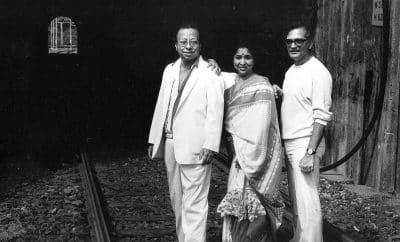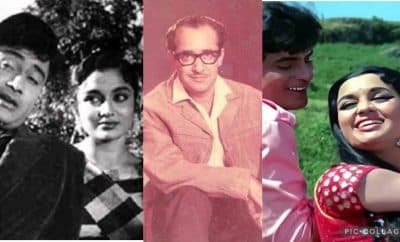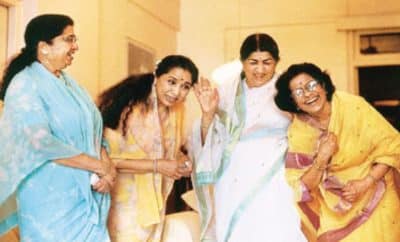Legends
Rahul Dev Burman – Chokhe Naame Brishti – Remembering and Appreciating His Journey From Bangla to Hindi
One common element in all music directors who composed for regional films as well Hindi films was the fact that a large share of their tunes were used in both the languages. In the case of Bengali music directors (MDs), almost all the leading Bengali MDs (be it SD Burman, Salil Chowdhury, Hemant Kumar and others) had their Bengali compositions made into Hindi as well. Rahul Dev Burman (Pancham) was no exception to this phenomenon. A huge number of his Bengali songs found their way into soundtracks of the Hindi films he composed for. A significant number of these Bengali songs were non-film songs more commonly known as “adhunik” (meaning “modern”) songs. They were also known as “Puja” songs (not because they had any religious undertones but simply because most of these songs and albums were released during Durga Puja, the biggest festival for Bengalis). In fact, some filmmakers have openly acknowledged that many a-time they used to pick and choose their songs from the “readymade Bengali finished versions” available to them.
While it has been stated earlier that a lot of Music Directors before Pancham used their Bengali originals in Hindi songs, what perhaps sets Pancham slightly apart from most of them is the fact that in a large number of instances he did not merely “re-use” the tune from the original. He (almost) always “re-made” it, be it in terms of arrangement, orchestration, choice of singers or even genre. Pancham more often-than-not changed the entire song whilst keeping the basic tune the same. For a listener, familiar with both the languages, it is a wonderful and joyous experience to discover this transformation. The renewed interest in Pancham’s music post-1994 led to many such discoveries, which over the years were lost in the sands of time.
On the occasion of Pancham’s 77th Birthday, here is a list of 7 songs which were originally made in Bengali and then remade in Hindi by the maestro. Whilst the task of having to choose from the vast material available has not been an easy one, the attempt is to pick out songs that have two completely different flavours in both their versions. For the benefit of those not familiar with Bengali, a brief description of the Bengali song is also provided…..so without further ado let’s begin our journey…..
1. Aamar Malatilata (Lata Mangeshkar, Pulak Bandhopadhyay. 1965, Puja Song)
The first instance of Pancham working with the nightingale for a Bengali song led to an amazing amalgamation of poetry(Pulak Bandhopadhay) and melody. Lata’s voice was pristine-pure, sugar-sweet and her little nuances throughout the song elevated it to even greater heights. Given the fact that Lata’s Bengali output was predominantly with Salil Chowdhury, Pancham’s entry was an absolutely brilliant one, and this song (along with Aami Boli Tomay) would find a place in most Bengali compilations of Lata’s great hits.
The song, for those not familiar with the language, is a love song, expressing the wonders and joys of first love. “Aami Shey Kawtha Janina…Aamaay Ke Go Debe Boley” enquires Lata (translated into “I do not know the reason for feeling this way, who will tell me)
https://www.youtube.com/watch?v=-M9lKL11xuc
Hum Aur Tum They Saathi (Kishore Kumar, Yogesh. Film – Hamare Tumhare 1979)
14 years later, Pancham uses the same tune…this time however not expressing the joys of new love, but in fact (just the opposite) to wistfully lament the loss of an old love. Hum Aur Tum They Saathi Abhi Hai Kal Ki Baat, Aaj Safar Mein Tumne Kyon Chhod Diya Mera Saath….sings Kishore in what was to be the title song for the 1979 Sanjeev Kumar-Raakhee starrer.
It is Pancham’s mastery in the way he arranges this song, the way he “makes” Kishore sing it (pathos-laden and mellifluous…highlighting something Asha Bhosle once acknowledged, “gaawana woh jaanta tha”), it sounds almost tailor-made for the situation, making us forget that originally in its Bangla avatar it began life as a romantic number.
https://www.youtube.com/watch?v=WWGfMUybRJM
PS: The same tune was also used 4 years earlier by Panchamin Deewaar, for the song Deewaron Ka Jungle Jiska Aabaadi Hai Naam (Manna Dey). The song, though included in the soundtrack, was sadly never used in the film.
2. Phire Esho Anuradha (RD Burman, Sachin Bhowmick, 1969, Puja Song)
Rahul Dev Burman’s (RD) first tryst with singing a Bengali song was in 1969 when he sang Mone Porey Ruby Rai (which became like an anthem for the Bengali youth at the time, reminicising about an adolescent crush). So in a way it was not a surprise that his follow up song to that was also about another lady “Anuradha”….Phire Esho Anuradha (Come back to me Anuradha) he sings, “Bhenge diye Shawb Baadha(Breaking all barriers)…….
Pancham’s full-throated cry seeking a return of his lost-love was yet another hit with the youth, whilst the older generation scoffed at the banal lyrics, “awdbhut”(strange) voice of the singer and (in general) a radical departure from the comforting Hemant-Salil combination they were used to for the “puja” songs. When he Sang Phire Esho, all of us (then) youngsters, wished that Anuradha would indeed return….soon.
https://www.youtube.com/watch?v=uiryPM2gmhc
Saajan Kahan Jaoongi Main (Lata Mangeshkar, AnandBakshi. Film – Jaise Ko Taisa, 1973)
From the haunting strains of the prelude, we know that this is going to be a “mystery” song….a genre commonly known as the “bhootiya” song in Hindi cinema parlance. Lata’s ethereal voice sounds haunting and piercing at the same time. The entire arrangement of the song creates and environment of suspense, intrigue and impending thrill. For someone not familiar with the Bengali version, it is actually impossible to imagine that the tune was originally used for a romantic song. It seems almost made-to-order for this type of a song, as RD manages to cloak the melodious tune with his masterly arrangement.
PS: The same tune was also recycled and modified slightly to create the title song Jahan Pe Savera Ho Basera Wahin, from the 1981 film, Basera.
https://www.youtube.com/watch?v=yUkdgDMddrs
3. Tomaate Aamate Dekha Hoyechhilo (Rahul Dev Burman, Swapan Chakraborty, 1974, Puja Song)
A lilting solo sung by Pancham, remembering a lost love. Tomaate Aamatae Dekha Hoyechhilo, Janina Kobe Kothaye(You and I had met sometime, don’t remember when and where) he sings. Classically tinged with blends of RaagBageshri and Shivranjani, Pancham’s vocals infuse the apt pathos that is a requisite for a song like this. When he repeats the phrase “janina” (I don’t know) from the line “Janina Kobe Kothaye” one’s heart instinctively twinges. The brilliance of Pancham lies in the fact that he never made a sad song sound depressing or morose. He always managed to create an ambience of melancholia and wistfulness with his choice of orchestration and even vocals. The sincerity in his singing actually contributes immensely to evoking the true mood of this song. Just shut your eyes whilst listening to this song and Pancham’s vocals guides you to that place in your heart where such memories (of lost love) reside.
Do Naino Mein Aansoo Bhare Hain (Lata Mangeshkar, Gulzar,Film – Khushboo, 1975)
What can one say about this Lata beauty from Khushboo? That Pancham knew exactly which singer to use for which song (after giving two nuggets to Asha in the same film, here he was turning to Lata for this gem)? That the brilliance of Gulzar’s lyrics (Do Naino Mein Aansoo Bhare Hain, Nindiya Kaise Samaaye) were (always, without fail) further enhanced by Pancham’s music? That Pancham had the class and confidence to really go sparse when the situation so demanded? The bare minimum orchestration in this song was indicative of the supreme confidence and knowledge Panchamhad as a composer. Music did not necessarily mean “sound”, “Instrument” or “noise”. Sometimes silence could also make such a huge impact. And of course, don’t miss the use of the flute in this sparsely orchestrated gem from Khushboo….evergreen, immortal!!!
4. Shey To Elo Na (Kishore Kumar, Mukul Dutt, 1972, Puja Song)
Legend has it that this song was written and composed by the lyricist-MD duo after waiting in vain for a visitor at Sun N Sand Hotel, Juhu, Mumbai, one evening. Who the visitor was- no one knows, but obviously the disappointment was heavy enough for a classic to be born. Shey To Elo Na, Elo Na, Keno Elo Na Janina (She didn’t come, Why I Don’t Know) sings Kishore kumar, and it is clearly a love song about the disappointment of a failed meeting of lovers. The whole song then goes on to depict a complete breakdown of the relationship and not merely a single missed appointment. Brilliantly rendered by Kishore Kumar, this song was an early indication of greater things to come from this magical duo.
Yeh Zindagi Kuch Bhi Sahi (Rahul Dev Burman, Anand Bakshi, Film – Romance 1983)
Pancham’s own rendition of this tune a decade after the Bengali original, was a rare instance where he sang the Hindi from a Kishore original (in most cases it was the other around with Pancham singing the Bengali and Kishore following suit with the Hindi version). Thematically, the Hindi version too was of loneliness and depair, but here the feeling was much more overwhelming than the Bengali version. Here was a man who was reflecting not just on a failed love, but in fact on the emptiness of his entire life. What makes this stand out is the way Pancham rendered this version – just simply out of the world. Straight from the heart. Straight to the heart!
https://www.youtube.com/watch?v=698TvCzRcxQ
PS: The song was used in the film during the Title/Credit scenes picturised on the leading man (Kumar Gaurav) wandering about in the valleys of Kashmir. Being thus used at the start of the film, with no connection to the plot or the story, diluted its effect to a large extent. But hear the audio in solitude and Pancham strikes a chord where he wants to …right in the heart!!!
5. Ele Na Tumi Je ( Rahul Dev Burman, SachinBhowmick, 1970, Puja Song)
Many casual listeners (and maybe even some hardcore fans) perhaps would have missed out on this original Bengali Pujarelease. That would not be surprising given the kind of skepticism Pancham’s Puja songs would receive from the conservative Bangali-Bhodrolok gentry in those early years (‘trite’ lyrics,’strange’ vocals etc). He was still in the process of bringing about a radical change in sound and melody and the Bengalis were taking some time to get adjusted to it. Right from the groovy prelude to the uninhibited vocals, Panchamtakes us on a ride rarely experienced before. Unlike the hindiversion (which was to become a smash hit and introduce his “grunge” vocals to Hindi playback singing) Pancham sings here in his ‘normal’ voice. But the arrangements are richer, the sound more raw, the music more innovative. Why, he even puts in a yodel or two from time to time. Here is a man simply ‘freaking out’ to his own music (his vocals on Tu Ruru Ta taTaa Ra is simply gob-smackingly awesome, better than any musical instrument). And boy is it infectious or what!!!!
Duniya Mein Logon Ko (Asha Bhosle, Rahul Dev Burman, Anand Bakshi, Film -Apna Desh, 1972)
The song that perhaps is most representative of Pancham, the singer, the vocalist. That infectious grunge voice, the jazz-laden arrangement, those famous grunts…and a classic was born!!! A cult-hit, this song single-handedly (perhaps) saved the fate of the film and prolonged Rajesh Khanna’s superstar period for a bit longer. Pancham adds a lot of sheen and gloss to the original composition for this version, including some mesmerizing vocals by Asha. In the end it is his singing that does the trick and is without a doubt, the highlight of the entire song. Now, even after 4 decades we still wonder whether he says “Veera” or “Beat-up” or “sweetheart” at the start of the song….but really, who cares…he’s having a blast singing it, just as we are, almost bobbing our heads in synch with the rhythm while hearing it for all these years!!!!
https://www.youtube.com/watch?v=dMJYOK-aeoQ
6. Chokhe Naame Brishti (Asha Bhosle, Gouriprasanna Majumdar, 1982, Puja Song)
It would be a crime to miss out on this absolute peach of a track by Asha Bhosle. Released in 1982 as a Puja number, it was Pancham in one of his mellow moments, introspective, pensive and wistful. A spontaneous outpour of lost-love, Ashainfuses a dignity and grace in the sublime melodies created by Pancham. Here was an artist who was peaking, getting more mature with his compositions. Chokhe Naame Brishti, BookeOthey Jhor Je, Tumi Toh Aaamar Ee Chhile, Aaj Koto PawrJe (Tears fill the eyes, a storm in the heart, you were mine once, now you are far away), the powerful lyrics are beautifully juxtaposed by the quiet soft melody, creating a wonderful complimentary effect. Asha sings like a dream, and somewhere along the line manages to draw a soft tear out from the corner of the listener’s eye.
https://www.youtube.com/watch?v=o_p08yiJukE
Jaane Kya Baat Hai (Lata Mangeshkar, Anand Bakshi, Film – Sunny, 1984)
Asha-Pancham Bengali or Lata-Pancham Hindi….it’s impossible to pick a winner here. This one has got to be a tie. No two ways about it. In an era, when cheap ‘disco’ music (with even ‘cheaper’ lyrics) were ruling the roost, here was the Prince of Pop, creating a semi-classical beauty for Lata. The film (Sunny starring Sunny Deol in the title role) sank at the box office (an action-hero playing a music-fan and lover-boy) and along with it sank all the glorious songs in the soundtrack. 30-odd years later when we hear Lata sing “Neend Nahi Aati, Badi Lambi Raat Hai”, we perhaps realize how wrong we were not to truly appreciate this gem when it was first presented to us.
7. Aaj Gunn Gungun Kunje Aamar (Asha Bhosle, Gouriprasanna Majumdar, Film- Rajkumari, 1970)
Rajkumari was the first Bengali film for Pancham, and he put his heart and soul into it. Starring the legendary Uttam Kumar and Tanuja (in the title role) the film was a breezy romance with lots of scope for music. The music that Panchamcomposed for this film was simply amazing. Inexplicably both the film and its accompanying soundtrack turned out to be super-flops, being outrightly rejected by the public in general. Paradoxically, all the songs from the film when re-used in subsequent Hindi films, turned out to be super-hits, be it Aap Ke Kamre Mein from Yaadon Ki Baarat, Yeh Jawani Hai Diwani from Jawani Diwani or Yeh Kya Hua from Amar Prem. Yes…the original of all these songs were first heard in the Bengali film…heard and forgotten!!! This particular beauty by Asha, when heard today, mesmerizes from the start. The lovely prelude, the glorious humming by Asha, and we are instantly drawn into the joyous world of a young woman experiencing the first flushes of love. The honey-drenched vocals and the lush arrangements create the perfect romantic picture the song is meant to paint on the screen. Asha Bhoslecaptures the true essence of a woman in love with this song, making us fall in love, all over again… Ei Toh Prothom Jiboney Aaj Haariye Gelo Monn (this is the first time I’ve lost my heart)…indeed!!!
Pyar Diwana Hota Hai (Kishore Kumar, Anand Bakshi, Film- Kati Patang, 1970)
Rajesh Khanna circa 1970. A tap on the piano, a twinkle in the eye, a nod of the head and Kishore Kumar serenading with Pyar Diwana Hota Hai Mastana Hata Hai…you’d have to be a stone not to fall in love!!! As with most things in life, the timing was the key…a new heart-throb, a revived singer and a young music director, immensely talented, full of new ideas….the old order was crumbling…the world of Hindi cinema was about to be transformed….Pancham was making his mark…in a big, big way!!!
https://www.youtube.com/watch?v=lslZptXok8



